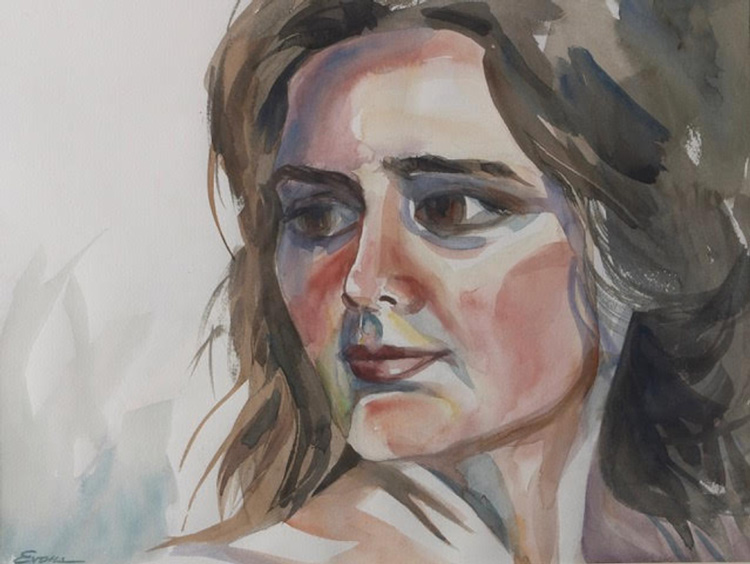For many unable to be with family or friends during Covid, isolation and loneliness have been barely bearable. Not seeing family or friends has been rough. I’ve not seen my three children and grandchildren for two years. For some its been even longer. Yet, human beings need each other. We are like elephants. The largest land animals on earth, elephants are extremely caring creatures living close together in herds, capable of complex thought, deep feeling, and sensitive emotions including compassion, love, sadness, grief, and joy. Read Masson’s When Elephants Weep or, right now, just look into the eyes of your dog, for dogs, too, feel emotions very like elephants, very like humans. Participating in the same world, having the same Creator, it is natural for us to desire to reach out to every living being. My Newfoundland’s eyes could penetrate me with a depth as profound as the humanity expressed in the eyes of a Rembrandt portrait.
Since I was 13, I’ve done portraits, first in local fairs, eventually by commission. Studying the human face, one reaches into the soulful identity of an individual. When I taught portraiture in high schools, and privately to adults in my various studio-gallery classes, I aimed to show them not only how to measure facial features correctly but how to capture the essence of the person posing. One assignment I required of my AP art students, and sometimes other art classes, was to create self-portraits of themselves, discovering emotional as well as physical details.
Once while serving as a CASA (Court Appointed Special Advocate for Abused Children), I worked with teenage girls who had been emergently removed from abusive homes and were temporarily living in a safe house. I was to give them art experiences. I chose to have them do life-size self-portraits. The girls, mostly black, many from poverty, and none with previous art experience, were at first a little fearful, hesitant, unsure of me, a white woman, about to teach them portraiture. They were afraid they would not be able to reproduce themselves correctly; weren’t sure they even wanted to. I reached out to them with kind words, explaining there was no right or wrong, that a self-portrait could be whatever they wanted it to be, to express themselves, their feelings. Then I drew a head for them, teaching every measurement and part of a face–eyes, nose, forehead, hair, etc. They became captivated. As they began their drawings, they got very serious, looking into the mirrors I’d handed each of them, studying what they saw–almost as if they’d never seen their images before. We had several days on this project and when we were finished, I hung all the deeply revealing colorful portraits on the walls of the dining hall. They were so proud! Beaming, they loved seeing who they were, commenting on each other’s work, connecting with each other, in a sense seeing into each other’s souls. After a couple weeks of working with them, I was due to leave. They did not want me to go, hugging me, holding my hands, touching my hair or a pin I wore, wanting more of what I’d given, more of what this art experience had meant to them. As I looked into their eyes, I saw love–the same love I felt for them. We had connected, much like a herd of elephants.
During this pandemic we, too, can still connect. If not face-to-face, at least by reading books that take us to people and places, or by reaching out to others via technology or by running neighborly errands, or creating and mailing hand-made cards. Any expression of feelings unites us, enables us to connect compassionately, to see each other more deeply–just like the elephants.
Glance is a watercolor portrait I did of Tara, a professional artists’ model who became a good friend and lived in our home for about 6 months when hers was destroyed. We shared some similar experiences and many good conversations and I painted her dozens of times.
